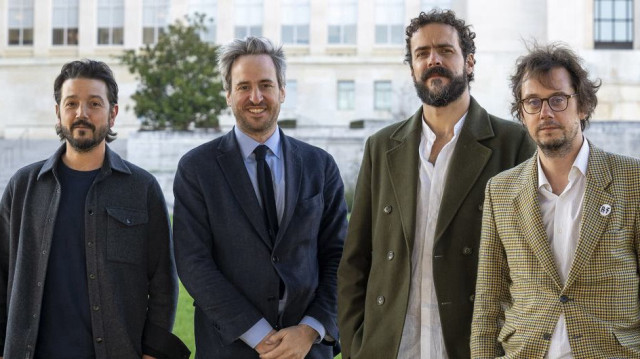
Centered on the lives of 4 journalists in Mexico, Luna and director Santiago Maza explore the stark accounts of the people risking it all for the truth
State of Silence, a gripping new documentary by Narcos star Diego Luna and director Santiago Maza, navigates the threatening risks, silenced communities, and the brutal violence faced by truth-seekers.
The film centers on the lives of Mexico-based journalists Jesus Medina, Marcos Vizcarra, Juan de Dios Garcia Tavish, and Maria de Jesus Peters and how organized crime, systemic corruption, and government inaction have come together to create a deadly environment.
One of the documentary's protagonists, Jesus, is a reporter from Morelos. In the face of death threats, he is forced to flee his community, south of the country's sprawling capital Mexico City. His departure not only uproots his life but also leaves his community absent a vital voice to the world.
Personal accounts and harrowing visuals in the film pay homage to journalists risking their lives in the pursuit of the truth. It serves as both a chilling depiction of the cost of speaking out and a global call to action against impunity.
In Geneva, where he was attending a screening of his new documentary, Diego Luna, the picture's producer along with Gael Garcia Bernal, stressed the need to protect journalists and combat impunity for crimes perpetrated against them.
Speaking to Anadolu, Luna, an actor, producer, and director from Mexico, highlighted the universality of the film's message. “I don't think you have to be (in) Mexico to sit down and see this documentary and start reflecting on your own relation with journalism.”
He underscored how the challenges journalists face transcend national borders, as threats to press freedom and access to information are issues that increasingly demand action worldwide, something the documentary seeks to bring about.
“We're asking for action against impunity. Not just from governments but also from media outlets and citizens,” he said, adding that with State of Silence, they also sought to honor those who risk their lives telling the truth.
Luna refrained from elaborating on the risks they faced during the filming process but highlighted the courage of local journalists featured in the documentary, who often report on their own communities under perilous conditions.
- ‘Silencing a journalist is silencing a community'
Luna stressed that when a journalist is forced to leave their home due to threats to their life and livelihoods, this can sever an entire community from the world.
He pointed to an example from Jesus' story. “When he had to leave his community because of a threat, he tells us in the documentary, the problem is he was the only journalist there.”
“So, we're not just talking about someone that had to leave his house, his community, his life,” he explained. “Also, we're talking about a community that lost their connection with other communities.”
Addressing the broader context of journalist killings in the world, Luna said that impunity allows violence to persist, calling it “ridiculous and unacceptable.”
“We have to assure the journalistic community that they can do their jobs safely,” he said adding: We're talking about public interest, we're talking about access to information, and we can't allow this to keep going.”
Globally, journalist deaths have reached unprecedented levels over the past year amid the ongoing Israeli offensive on the Gaza Strip, which has claimed the lives of dozens of media professionals.
“I live in a country where impunity is huge,” Luna said. “And this violence against journalists in Mexico happens because it's possible. The journalistic community deserves our attention, our indignation ... we're not just talking about this violence, we are also talking about our right to be informed.”
“This is something we all have to fight for.”
Mexico ranks 121st in the World Press Freedom Index and 165th in terms of safety, according to Reporters Without Borders. A staggering 155 journalists have been killed in the country since 2000 due to organized crime.
According to data from the International Federation of Journalists (IFJ), 72 journalists have been killed in 2024 so far, with motives confirmed to be related to their coverage. This follows what the IFJ has described as "one of the worst years" for journalist fatalities in 2023, when over 100 were killed, largely as a result of the Gaza war.
Hello, the comments you share on our site are a valuable resource for other users. Please respect other users and different opinions. Do not use rude, offensive, derogatory, or discriminatory language.
The floor is all yours.








